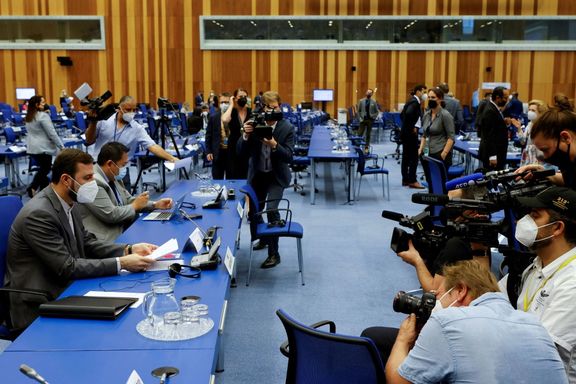No US Move Yet To Rebuke Iran At UN Nuclear Meeting

The United States continues to discuss with European states a possible censure of Iran at next week’s board meeting of the United Nations nuclear watchdog.

The United States continues to discuss with European states a possible censure of Iran at next week’s board meeting of the United Nations nuclear watchdog.
Ned Price, the US State Department spokesman, said Tuesday it was important for the UN’s International Atomic Energy Agency to follow up what it deems Iran’s inadequate explanations of past nuclear work as Washington consults with “allies and partners.”
But Price said Washington still wanted agreement with Tehran over reviving the 2015 Iran nuclear deal, the JCPOA (Joint Comprehensive Plan of Action).
Earlier discussions between the US and Europeans over rebuking Iran at the IAEA board have reportedly concluded this might undermine efforts to achieve agreement over the JCPOA in the year-long talks between Iran and six world powers in Vienna that paused in March.
Rafael Mariano Grossi, the IAEA chief, said in a report this week that Iran had failed to deliver so far on assurances made in March to satisfy the agency by late June over outstanding issues in its pre-2003 atomic work.
While Price noted that these “unresolved safeguards issues,” referring to Tehran’s basic obligations under the Nuclear Non-Proliferation treaty (NPT), were “separate” from paused talks to revive the JCPOA, a tweet earlier Tuesday from Israeli prime minster Naftali Bennett appeared designed to stymie efforts to revive the JCPOA. Bennett revealed documents from 2004-5 that he said showed Iran using stolen IAEA files to “systematically evade nuclear probes.”
“We have always said that outstanding safeguards issue…need to be resolved,” Price said. “We have done what we believe together with our IAEA partners to be most effective in confronting Iran’s nuclear activities, including what is very clearly its past nuclear deception, just as we work with the IAEA to determine whether we can achieve a mutual return to compliance with the JCPOA.”
‘The Iranians are not there’
Price reiterated that an agreement to revive the JCPOA depended on Iran dropping “demands that go beyond the JCPOA,” apparently referring to Tehran’s argument that the US should remove the Revolutionary Guards (IRGC) from its list of ‘foreign terrorist organizations,’ so reversing a decision taken by President Donald Trump in 2019 the year after he withdrew the US from the JCPOA.
But Price insisted that agreement on reviving the JCPOA was “absolutely still within reach.”
Senator Bob Menendez, the Democrat chairing the Senate Foreign Relations Committee, called Tuesday for an end to any talks to revive the JCPOA. Speaking to a dinner in New Jersey organized by the American Israel Public Affairs Committee (Aipac), which has opposed the JCPOA, Menendez said it was “time to tell the Europeans, who[m] we have shown good faith with, that we were willing to enter into what was hopefully a stronger and longer deal, that the Iranians are not there.”
Both supporters and opponents of the Biden administration’s approach claim their arguments are strengthened by the IAEA reporting this week that Iran has now 43.3kg (95lb) of uranium enriched to 60 percent, an increase of nearly 10kg (22lb) in three months.
While a nuclear weapon requires uranium enriched to 90 percent, the step from 60-percent enrichment is fairly straightforward. Under the JCPOA, Iran enriched only to 3.67 percent, but began expanding its nuclear program, and reducing cooperation with the IAEA, after the US left the JCPOA in 2018 and imposed ‘maximum pressure’ sanctions.